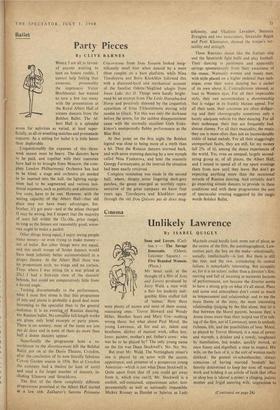Ballet
Party Pieces
By CLIVE BARNES Wmt.g I am all in favour of anyone wanting to turn an honest rouble, I cannot help feeling that Unquestionably the expenses of this three- week season must be heavy. The dancers have to be paid, and together with their costumes have had to be brought from Moscow, the com- plete London Philharmonic Orchestra has had to be hired, a stage and orchestra pit needed to be inserted into the hall, the lighting equip- ment had to be augmented and various inci- dental expenses, such as publicity and administra- tive costs, have to be met. However, with the seating capacity of the Albert Hall—that old place may not have many advantages, but, brother, it's got seats—and at the prices charged (I may be wrong, but I suspect that the majority of seats fall within the 15s.-30s. price range), as long as the houses are reasonably good, some- one ought to make a packet.
Other things being equal, I enjoy seeing people make money—or even trying to make money— out of ballet. But other things were not equal, and this small troupe of Soviet dancers would have been infinitely better accommodated in a proper theatre. At the Albert Hall there was no proscenium arch, no wings and no curtain. From where I was sitting (in a seat priced at 25s.) I had a first-rate view of the dancers' behinds, but could see comparatively little from a decent angle.
Turning discontentedly to the performance, what I must first stress is that this programme of bits and pieces is probably a good deal more interesting to the specialist than to the general , audience. It is an evening of Russian dancing, not Russian ballet. No complete full-length works are given, only brief excerpts or party pieces. There is no scenery, most of the items are just pas de deux and in none of them do more than half a dozen dancers appear.
Superficially the programme bore a re- semblance to the divertissement bill the Bolshoi Ballet put on at the Davis Theatre, Croydon, after the conclusion of its now literally fabulous Covent Garden season in, 1956. But at Croydon the company had a theatre (at least of sorts) and used a far larger number of dancers, in- cluding Ulanova and Struchkova.
The first of the three completely different programmes promised at the Albert Hall started at a low ebb. Zakharov's famous Polonaise Cracovienne from Ivan Susanin looked insig- nificantly small beer when danced by a mere three couples on a bare platform, while Nina Timofeyeva and Boris Khokhlov followed this with a diamond-hard and mechanical account of the familiar Odette/Siegfried adagio from Swan Lake Act IL Things were hardly bright- ened by an excerpt from The Little Humpbacked ' Horse and positively dimmed by the coquettish apparition of Irina Tikhomirnova waving wild muslin to Gluck. Yet this was only the darkness before the storm, for the saddest disappointment came with the normally excellent Gleb Evdo- kimov's unexpectedly flabby performance as the Blue Bird.
At that point on the first night the Bolshoi legend was close to being more of a myth than a hit. Then the Russian dancers stormed back, and with some stunning dancing by a new nymph called Nina Fyedorova, and later the masterly Georgy Farmanyants, at the interval the situation had been nearly retrieved.
Complete restitution was made in the second half, where, despite some lingering dark-grey patches, the group emerged as worthily repre- sentative of the great company we knew four years ago. Timofeyeva and Khokhlov swept through the old Don Quixote pas de deux mag- nificently, and Vladimir Levashev, Suzanna Zvyagina and two newcomers, Alexander Begak and Piotr Khomutov, showed the troupe's ver- satility and strength.
These Russians dance like the Italians sing and the Spaniards fight bulls and play football. Their dancing is passionate and apparently springs spontaneously from their awareness of the music. Womanly women and manly men, with style placed on a higher pedestal than tech- nique, even their worst dancing has a cachet of its own about it. Contradictions abound, at least to Western eyes. For all their impeccable style, they can accommodate a showmanship that is vulgar in its frankly blatant appeal. For all their taste, their costumes are often disfigur- ing and their choreography sometimes only a barely adequate vehicle for their dancing. For all their technique, their feet are frequently bad, almost clumsy. For all their musicality, the music they use is more often than not an inconsiderable tinkle of banal melody. For all their staggeringly unimportant faults, they are still, for my money (all 25s. of it), among the dance experiences of the world. Yes, even an unequal, largely second- string group at, of all places, the Albert Hall, and I intend to spend all of my spare evenings there from now until they leave. But don't go expecting anything more than the occasional miracle of Russian dancing. And certainly don't go expecting sixteen dancers to provide in these conditions and with these programmes the sort of spectacular evening suggested by the magic words Bolshoi Ballet.


























































 Previous page
Previous page